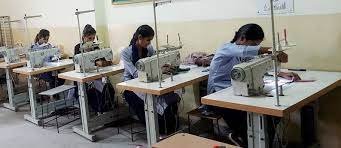Home > Courses
Courses
Industrial Training Institute (ITI)
Our ITI programs, aligned with the National Skill Qualification Framework (NSQF), equip rural youth with industry-relevant skills through four specialized trades: Electrician (2 years), Fitter (2 years), Sewing Technology (1 year), and Horticulture (1 year). With a near-100% placement rate, we have empowered hundreds of graduates to secure rewarding careers. Over the past decade, dozens of our alumni have joined the prestigious Indian Railways, while more than 100 have been employed by leading multinational corporations, including TATA, Bhusan Steels, Arati Steels, Vedanta Alumina, NALCO, Rourkela Steel Plant, and CESU. Below is an overview of our four trades:

ELECTRICIAN (2 Years)
The Electrician trade trains students in the installation, maintenance, and repair of electrical systems, preparing them for roles in industries ranging from construction to manufacturing. Through hands-on training in wiring, circuit design, and safety protocols, our students master the skills needed to meet the growing demand for skilled electricians. Graduates are equipped to work in urban and rural settings, contributing to infrastructure development and energy solutions, with many securing positions in prestigious organizations like Indian Railways and NALCO.

FITTER (2 Years)
The Fitter trade focuses on assembling, installing, and maintaining mechanical systems and machinery. Students learn precision techniques, including the use of tools, blueprint reading, and equipment maintenance, preparing them for careers in manufacturing, automotive, and industrial sectors. Our rigorous training ensures graduates are job-ready, with many placed in top companies like TATA, Bhusan Steels, and Rourkela Steel Plant, driving technical excellence in India’s industrial landscape.

ITI SEWING TECHNOLOGY (1 Year)
Our Sewing Technology program empowers individuals, particularly women, with skills in garment construction, stitching, and embroidery. This one-year course covers modern sewing techniques, pattern-making, and textile design, enabling graduates to pursue entrepreneurial ventures or secure jobs in the textile industry. Notably, 120 women trained in this program have achieved economic independence, with 100 forming the Koushal Vikash Udyogi Trust, a registered entity producing school uniforms, masks, and other garments, fostering self-reliance and community enterprise.

ITI HORTICULTURE (1 Year)
The Horticulture trade equips students with expertise in plant cultivation, landscaping, and sustainable farming practices. Through practical training on CIT’s 5-acre farmland, students learn nursery management, crop production, and organic farming techniques. This program prepares graduates for careers in agriculture, gardening, and environmental conservation, supporting Odisha’s rural economy. Many alumni contribute to CIT’s broader agricultural initiatives, such as micro-watershed projects and Farmers Producer Organizations, enhancing local livelihoods.

Environmental Conservation
CIT is a steward of Odisha’s natural heritage, protecting 680 hectares of forest land through 180 Vana Suraksha Samitis (Forest Protection Committees). These community-led initiatives promote biodiversity and sustainable resource use, preserving ecosystems for future generations. In collaboration with the Quality Council of India, we conducted a one-day training program on 10 medicinal plants, engaging 90 participants in herbal cultivation. This initiative blends environmental conservation with economic opportunities, fostering communityled solutions to environmental challenges.

Infrastructure
Located just 500 meters from SH 65, CIT’s campus in Champeswar, Cuttack, is a hub of learning and innovation. Our facilities include a spacious institute building, a well-equipped computer lab with 24/7 power backup, a library, and a dedicated training hall. We also offer a hostel for students, a staff room, a store room, and a 5-acre farmland for practical agricultural training. With 40 skilled staff members, including administrative, technical, and field experts, we ensure high-quality training and community support.
Skill Development
CIT’s skill development programs empower rural youth, women, and farmers with practical skills to achieve economic independence and entrepreneurship. Aligned with national initiatives like PMKVY, RPL, PM Vishwakarma, and Samarth Textiles, our training programs cater to diverse needs, from artisanal crafts to healthcare and agriculture. We have transformed lives by training 120 women in sewing and embroidery, with 100 forming the Koushal Vikash Udyogi Trust, a registered entity producing garments. Additionally, 120 girls trained as frontline health workers, with 50 securing immediate placements under Odisha’s Health Department, and 120 youths trained through our Community Driving Training School (CDTS), most of whom secured privatesector jobs. Below is a detailed overview of our skill development programs:
PMKVY (Pradhan Mantri Kaushal Vikas Yojana)
Applique Artisan
Our Applique Artisan course trains participants in the traditional art of applique work, a vibrant craft involving decorative fabric designs. Trainees learn stitching, layering, and embellishment techniques to create products like wall hangings, bags, and home décor items. This program empowers rural women and youth to preserve cultural heritage while generating income through entrepreneurial ventures or employment in the handicraft industry, contributing to Odisha’s rich artisanal legacy.
Chauffeur L4
The Chauffeur L4 program equips rural youth with professional driving and vehicle maintenance skills, preparing them for roles as commercial drivers or chauffeurs. Through practical training in safe driving, traffic regulations, and customer service, participants gain employability in the transport and logistics sectors. Many graduates secure private-sector jobs, enhancing their financial stability and supporting rural mobility.
Hand Embroidery
The Hand Embroidery course teaches intricate stitching techniques to create detailed textile designs, empowering women and youth to produce marketable products like clothing and accessories. Trainees learn traditional and modern embroidery methods, fostering creativity and entrepreneurship. This program has enabled participants to join initiatives like the Koushal Vikash Udyogi Trust, driving economic empowerment through sustainable livelihoods.
Frontline Health Worker
Our Frontline Health Worker training prepares rural women for roles in community healthcare, covering basic medical care, first aid, and health awareness. Of the 120 girls trained, 50 secured immediate placements with the Health Department of Odisha, delivering essential services to rural communities. This program strengthens healthcare access and empowers women to contribute to public health, fostering social impact.
RPL (Recognition of Prior Learning)
Mushroom Grower
The Mushroom Grower program trains farmers in the cultivation, harvesting, and marketing of mushrooms, a high-demand, low-investment crop. Participants learn spawn production, composting, and post-harvest techniques, enabling them to start small-scale enterprises. This initiative supports rural livelihoods by promoting sustainable agriculture and income diversification, aligning with CIT’s mission to enhance food security.
Floriculture
PM Vishwakarma
Mason
The Mason training program equips participants with skills in bricklaying, plastering, and construction techniques, preparing them for roles in the building industry. Trainees learn to construct durable structures, adhering to safety and quality standards. This program empowers rural youth to secure jobs in construction or start their own ventures, contributing to infrastructure development in Odisha.
Carpenter
Our Carpenter course trains individuals in woodworking, furniture making, and structural carpentry, using both traditional and modern tools. Participants develop skills to craft high-quality products, meeting the demand for skilled carpenters in rural and urban markets. Graduates contribute to local economies through employment or entrepreneurial ventures, enhancing community infrastructure.
Fishing Net Maker
Samarth Textiles
Applique Artisan
Under the Samarth Textiles scheme, our Applique Artisan program enhances traditional applique skills, focusing on creating intricate textile products for modern markets. Trainees, primarily women, learn advanced stitching and design techniques, enabling them to produce high-value items like sarees and home décor. This program empowers participants to join cooperative ventures like the Koushal Vikash Udyogi Trust, fostering economic independence and cultural preservation.
Agriculture and Allied Activities
CIT is dedicated to advancing sustainable agriculture and allied activities to strengthen rural livelihoods in Odisha. Our programs empower farmers through innovative practices, resource access, and market linkages, benefiting thousands across the region. We have trained 6,300 farmers in modern agricultural techniques and supported the formation of 360 Water User Associations (Pani Panchayats) and 100 Farmers Producer Organizations (FPOs). Below is a detailed overview of our key agricultural initiatives:
Pani Panchayat Formation
CIT has facilitated the formation of 360 Water User Associations (Pani Panchayats), empowering farmers to manage irrigation resources collectively. These community-led groups ensure equitable water distribution, optimize agricultural productivity, and promote sustainable water use. By fostering collaboration among farmers, Pani Panchayats have strengthened irrigation infrastructure, benefiting thousands of small and marginal farmers across Odisha. Our training programs enhance farmers’ capacity to maintain and manage water systems, ensuring long-term agricultural resilience.
CDP-MLIP (Crop Diversification Programme under Mega Lift Irrigation Points)
Under the Crop Diversification Programme (CDP-MLIP), supported by the Department of Agriculture and Farmers’ Welfare, Government of Odisha, CIT is transforming 948 hectares of agricultural land in Narasinghpur Block. This initiative promotes diversification from paddy to non-paddy crops such as pulses, oilseeds, maize, millets, and vegetables in areas served by Mega Lift Irrigation Points. Approximately 4,000 farmers have benefited from our comprehensive support, including awareness campaigns, training programs, bioinputs, custom hiring centres, post-harvest processing, and market linkages. We have also facilitated FPO formation to enhance market access, enabling farmers to achieve higher incomes and sustainable livelihoods.
Mechanized Direct Seeded Rice Program
CIT implements the Mechanized Direct Seeded Rice (DSR) Program, supported by the Department of Agriculture and Farmers’ Welfare, Government of Odisha, across six blocks in Cuttack district. This initiative promotes efficient rice cultivation by using mechanized direct seeding techniques, reducing water and labor requirements compared to traditional methods. By providing training, access to modern equipment, and technical support, we empower farmers to adopt sustainable practices, increase yields, and reduce environmental impact. This program strengthens food security and supports Odisha’s agricultural innovation.
Promotion of Sericulture
In collaboration with the Department of Textiles, Government of Odisha, CIT promotes sericulture through the rearing and breeding of Eri and Seri silkworms and castor cultivation, a key feed crop for Eri silkworms. This initiative benefits tribal and rural communities in remote forest villages, providing a vital income source where other opportunities are limited. We have supported the formation of cooperative societies to streamline silk production and marketing, empowering participants to access markets and government schemes. By integrating sustainable practices, our sericulture program enhances economic resilience and preserves traditional livelihoods.
Natural Farming and Lemon Grass Farming
CIT champions natural farming to promote eco-friendly and cost-effective agricultural practices. Our initiatives include training farmers in organic techniques, bio-input preparation, and crop diversification to enhance soil health and reduce dependency on chemical inputs. Lemon grass farming, a key focus, enables farmers to cultivate this high-value crop for essential oil production, offering an alternative income source. Through practical training on CIT’s 5- acre farmland, we equip farmers with the skills to grow lemon grass and access markets, fostering sustainable livelihoods and environmental stewardship.
Entrepreneurship and Community Development
CIT champions entrepreneurship and community development to drive sustainable progress in rural Odisha. By fostering economic independence and social empowerment, we enable individuals and communities to access opportunities and build resilient livelihoods. Our initiatives include forming Farmers Producer Organizations (FPOs), providing entrepreneurship training, and promoting education, health, and leadership. Below is a detailed overview of our key programs:
Farmers Producer Organizations (FPOs)
CIT has promoted and supported the formation of three Farmers Producer Organizations (FPOs) in Cuttack district, empowering farmers to collectively access markets, resources, and government schemes. These FPOs enable small and marginal farmers to pool resources, negotiate better prices for their produce, and access modern agricultural inputs. Through training in business management, quality control, and market linkages, we help FPOs operate sustainably, enhancing farmers’ incomes and strengthening rural economies. This initiative aligns with our broader agricultural programs, such as the CDPMLIP, to ensure comprehensive support for Odisha’s farming communities.
Entrepreneurship Development Programme (EDP)
In partnership with the District Industries Centre (DIC), Cuttack, and the Swakalp scheme of the Government of Odisha, CIT has provided Entrepreneurship Development Programme (EDP) training to over 300 new entrepreneurs. These programs equip rural youth, women, and farmers with essential skills in business planning, financial management, marketing, and innovation. Trainees learn to start and scale micro-enterprises, from handicrafts to agricultural ventures, fostering economic self-reliance. By connecting participants to government schemes and local markets, our EDP initiatives create sustainable livelihoods and drive community-led economic growth, empowering individuals to transform their ideas into successful businesses.

